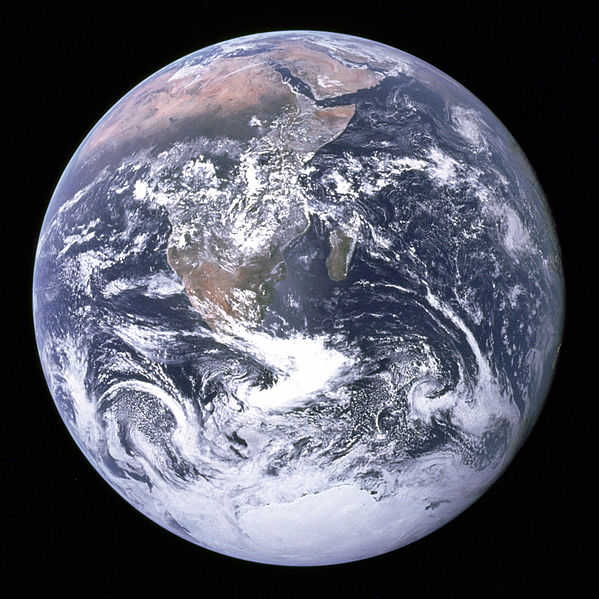A recent “Ziggy” cartoon by Tom Wilson depicts Ziggy being confronted by two aliens, one of whom comments: “Earth? You named your planet after dirt?” Yep, Earth is the only planet whose English name does not derive from Greek/Roman mythology; the name comes from the Old English word eorðe (erda in Old High German): “Earth: O.E. eorþe ‘ground, soil, dry land,’ also used (along with middangeard) for ‘the (material) world’ (as opposed to the heavens or the underworld), from P.Gmc. *ertho (cf. O.Fris. erthe “earth,” O.S. ertha, O.N. jörð, M.Du. eerde, Du. aarde, O.H.G. erda, Ger. Erde, Goth. airþa), from PIE base *er- ‘earth, ground’ (cf. M.Ir. -ert ‘earth’). The earth considered as a planet was so called from c.1400” (source).
“Terra” is another western word that refers to Earth, but it is from Latin: “Terms that refer to the Earth can use the Latin root terr-, as in terraform and terrestrial. An alternative Latin root is tellur-, which is used in words such as tellurian and tellurium. Such terms derive from Latin terra and tellus, which refer variously to the world, the element earth, the earth goddess, and so forth. Scientific terms such as geography, geocentric, and geothermal use the Greek prefix geo- (γαιο-, gaio-), from gē (again meaning ‘earth’)” (source).
The fact that the English name for our planet predates Copernicus and the concept of Earth being a planet seems to be a major factor in it being named after words for the middle world between heaven and hell– the “ground, soil, or dry land,” as opposed to water, air, and fire. Those earthy words resonate with the concept of fertility and the cycle of life, as reflected in the terms terra mater (Latin for “Mother Earth”) and Gaia (the primordial Earth goddess who gave birth to several dieties in ancient Greek religion). Before people knew that Earth was a planet, some even speculated that it was a flat piece of land on the back of four elephants which, in turn, were on the back of a turtle which was surrounded by the ocean.
As for how and when the term “Earth” arose, “Unfortunately, I think it’s pretty impossible to say exactly who first named the planet ‘Earth’. Actually, I really doubt one person really named it intentionally; rather it developed over time as part of the English language. It seems likely that people used Earth to mean ‘land’ and then it was the natural thing to refer to all the land and the planet. I tried to look up more specific details about the specific usage of the word over time, but even the Oxford English Dictionary (online) admits: ‘Men’s notions of the shape and position of the earth have so greatly changed since Old Teutonic times, while the language of the older notions has long outlived them, that it is very difficult to arrange the senses and applications of the word in any historical order.’ So, as with the names of the other planets that have been known throughout human history…, it’s difficult to say who first thought of the planet as Earth. The names were part of culture even before we really understood the significance of what planets are and where they are in space” (source).
God called the dry land Earth, and the waters that were gathered together he called Seas. And God saw that it was good (Genesis 1:10; English Standard Version)
Article by Bill Norrington



